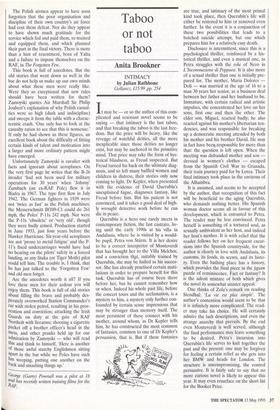Taboo or not taboo
Anita Brookner
INTIMACY by Julian Rathbone Gollancz, £15.99 ,pp. 254 It may be — or so the author of this com- plicated and resonant novel seems to be saying — that intimacy is the last taboo, and that breaking the taboo is the last free- dom. But the price will be heavy, like the revenge of watchful deities, all the more inexplicable since those deities no longer exist, but may be anchored in the primitive mind. That price may take the form of hys- terical blindness, as Freud suspected. But Freud turned his back on the ultimate diag- nosis, and so left many baffled women and children in distress, their stories only now coming to light. Dr Kepler, when presented with the evidence of David Querubin's unexplained fugue, diagnoses fantasy, like Freud before him. But his patient is not convinced, and it takes a good deal of high- ly wrought detective work before he can die in peace.
Querubfn is a hero one rarely meets in contemporary fiction, the last castrato, liv- ing until the early 1990s at his villa in Andalusia, where he is visited by a would- be pupil, Petra von Stiirm. It is her desire to be a correct interpreter of Monteverdi that has brought her to the Villa Melchor, and a conviction thpt, suitably trained by Querubfn, she may be hailed as his succes- sor. She has already practised certain muti- lations in order to prepare herself for this task. Querubfn has of course been there before her, but he cannot remember how or when. Indeed his whole past life, before the concert tours and the acclamation, is a mystery to him, a mystery only further con- founded by certain sense impressions that may be stronger than memory itself. The most persistent of these connect with his mother, around whom, as Dr Kepler tells him, he has constructed the most common of fantasies, common to one of Dr Kepler's persuasion, that is. But if these fantasies are true, and intimacy of the most primal kind took place, then Querubfn's life will either be restored to him or removed even further. In the event it is a conjunction of these two possibilities that leads to a botched suicide attempt, but one which prepares him for a relatively easy death.
Disclosure is intermittent, since this is a psychological thriller, reinforced by a his- torical thriller, and even a musical one, as Petra struggles with the role of Nero in L'Incoronazione di Poppaea. It is also more of a sexual thriller than one is initially pre- pared for. The mother, Maria Dolores -- Doli — was married at the age of 16 to a man 30 years her senior, as a business deal between her father and her husband to be. Immature, with certain radical and artistic impulses, she concentrated her love on her sons, first one and then the other. The elder son, Miguel, reacted badly; he also reacted against his mother's libertarian ten- dencies, and was responsible for breaking up a democratic meeting attended by both his mother and his brother David. He may in fact have beesi responsible for more than that: the question is left open. When the meeting was disbanded mother and son dressed in women's clothes — escaped from the Spanish Civil War to Granada, their train journey paid for by Lorca. Their final intimacy took place in the environs of the Alhambra.
It is assumed, and seems to be accepted by the author, that recognition of this fact will be beneficial to the aging Querubfn, who demands nothing better. His Spanish woman doctor seems all in favour of this development, which is entrusted to Petra. The reader may be less convinced. Petra herself is something of a tortured soul, as sexually ambivalent as her host, and indeed her host's mother. It is with relief that the reader follows her on her frequent excur- sions into the Spanish countryside, for the author is clearly in love with Andalusia, its customs, its foods, its scents, and its histo- ry. Even the bathing place has a history, which provides the final piece in the jigsaw puzzle of reminiscence. Fact or fantasy? It is the adroit mixture of both which gives the novel its somewhat sinister appeal.
One thinks of Zola's remark on reading Stendhal: 'La vie est plus simple'. The author's contention would seem to be that it is infinitely more complicated. The read- er may take his choice. He will certainly admire the lush descriptions, and even the strange anarchy that prevails. By the end even Monteverdi is well served, although the final performance may leave something to be desired. Petra's incursion into Querubin's life serves to knit together the past and the present: one may be forgiven for feeling a certain relief as she gets into her BMW and heads for London. The structure is uncompromising, the control persuasive. It is fairly safe to say that no more curious novel is likely to appear this year. It may even resurface on the short list for the Booker Prize.


































































 Previous page
Previous page